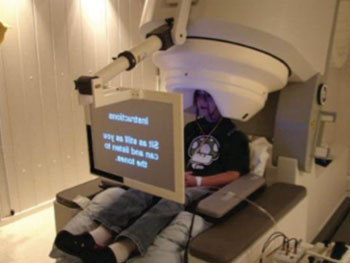Study Suggests Language Delay Linked to Chromosome Deletion in Children with Neurological Disorders
By MedImaging International staff writers
Posted on 25 Feb 2015
A study found that children with neuro-developmental problems born with DNA duplications or deletions on part of chromosome 16, show measurable delays in their ability to process sound and language. Posted on 25 Feb 2015
Previous research had found changes in chromosome 16 correlated with some Autism Spectrum Disorders (ASDs), language impairments, and delays in developmental. The study was published online in the February 11th issue in the Cerebral Cortex journal.

Image: Measuring the Magnetic Activity in the Brain of a Child, Using a MEG machine. (Photo courtesy of Children\'s Hospital of Philadelphia).
The researchers studied 115 children. Forty-three of the children had DNA deletion, and 23 had DNA duplication. The control group consisted of 49 healthy children. Only a small number of the children had been diagnosed with ASD diagnoses.
The researchers used Magnetoncephalography (MEG), a functional neuroimaging technique, to detect magnetic fields in the brain. The children were exposed to a series of tones, and the MEG machine analyzed how magnetic fields in the child's brain changed. The researchers found a significant delay of 23 ms in children with the deletion, much higher than that experienced by the healthy children. The children with the duplication showed no such delay, and could process sounds slightly faster than the healthy children.
The study team included radiologists and psychologists, and was led by Timothy P.L. Roberts, PhD, vice chair of Radiology Research at the Children's Hospital of Philadelphia (CHOP; Philadelphia, PA, USA) and researcher at CHOP's Center for Autism Research (Philadelphia, PA, USA). A team from the University of California, San Francisco (UCSF; USA) led by Elliott H. Sherr, MD, PhD, also took part. John E. Spiro of the Simons Foundation Autism Research Initiative (SFARI; New York, NY, USA) was a coauthor of the study, and the foundation provided grant support.
Timothy P.L. Roberts, PhD, vice chair of Radiology Research at CHOP and researcher at CHOP's Center for Autism Research, commented, "This study shows an important connection between gene differences and differences in neurophysiology. It may also help to bridge a largely unexplored gap between genetics and behavior."
Roberts expects future studies to investigate other genes also implicated in ASDs, and other psychiatric disorders, in order to find whether they also involve similar response delays.
The research may be a basis for future medical treatments for some forms of autism, and cognitive, and language disabilities.
Related Links:
The Children's Hospital of Philadelphia (CHOP)
CHOP's Center for Autism Research
UCSF














